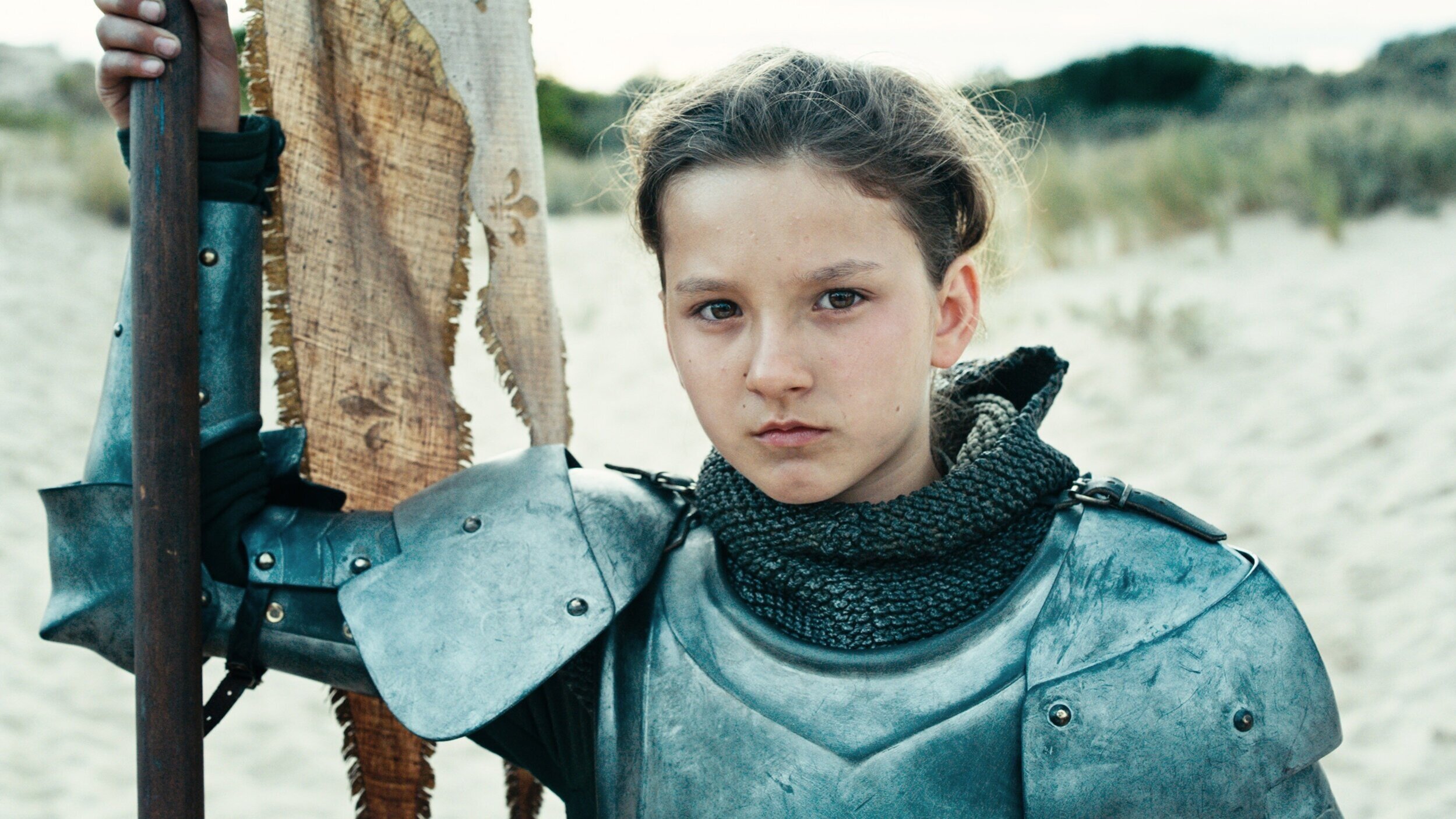Joan of Arc
A subject that continues to attract filmmakers and challenges them to find a fresh take on it.
Lise Leplat Prudhomme
Given that Bruno Dumont's feature debut was a study of contemporary life in northern France that carried a well-earned '18' certificate but bore the title La vie de Jésus, it is perhaps appropriate to state at the outset that this latest work of his actually is about Joan of Arc. Indeed, while it stands alone perfectly well, this is a sequel to his 2017 film which was not released here, Jeannette: The Childhood of Joan of Arc. Two undoubted classics of cinema, The Passion of Joan of Arc made by Carl Theodor Dreyer in 1928 and Robert Bresson's 1962 work The Trial of Joan of Arc are surely the most distinguished of the films about her but, even though Joan is France's greatest national heroine, the sheer number of them is quite remarkable. One might easily have expected that this further treatment by Dumont, which acknowledges Charles Péguy's plays as a chief source, would have nothing new to offer but it proves to have a voice of its own. The individuality on display here is sometimes bizarre and challenging but even so it does add up to a work that is intriguing in its own right. It is also a film that shows proficiency on a technical level.
The story told here is set during the last two years of Joan's life starting in 1429 when she had already been acclaimed for leading the French army to victory although we find her early on failing to take back Paris from the English and their allies. Albeit limited to her later years, Dumont's Joan of Arc is dealing with a life which, short as it was, encompassed so much that any filmmaker has to choose a particular emphasis and approach. Joan's trial in Rouen as a heretic which followed her capture is a central feature here but unlike Bresson Dumont does not focus on this exclusively so it becomes part of this film's tone that anything that could be thought of as an action scene is played down. Thus no battle scenes of a standard kind are included, Joan's capture is indicated only indirectly and her ultimate fate, burnt at the stake, is covered by a single far distant shot.
Two highly unusual features show Dumont at his most idiosyncratic and may prevent some viewers from accepting this film. There are several moments which find Joan being addressed as 'my child' or referred to as a girl and that is apt enough since Joan was not yet twenty when she died. But that is very different from being asked as we are here to regard as credible a Joan played by a 10-year-old. Nevertheless, Dumont has indeed opted to use Lise Leplat Prudhomme who more understandably appeared as Joan in the childhood scenes of his 2017 film. At the outset this casting is somewhat disconcerting, but she brings to the role a remarkable strength and somewhat androgynous looks so that before long I found myself fully endorsing Dumont's decision. No less extraordinary is the film's use of songs in three significant scenes. Given the eccentricity of the casting of Joan and the inclusion of some early overhead shots of Joan's soldiers, a degree of stylisation ceases to be out of place and thus it is that it works much better than one would expect when on two occasions an anachronistic song on the soundtrack in a relatively modern idiom expresses Joan's thoughts (it feels more questionable when a third song of this kind is incorporated later on to echo the warning being voiced by one of her inquisitors regarding Joan's potential fate).
The insertion of these songs as part of the score composed by the late Christophe who also acts in the film is, in effect, part and parcel of what proves to be the most successful aspect of Dumont's approach as writer/director. The camera may gaze skyward from time to time but this Joan of Arc is at pains not to let us hear the voices from God who have guided Joan in her actions. Indeed, on several occasions Dumont's Joan has to come to decisions of her own because her voices have not spoken further. If the film's treatment of the clergy in the trial, including such key figures as Bishop Cauchon (Jean-François Causeret) and Nicolas L'Oiseleur (Fabien Fenet), is such as to make them the inhumane villains of the piece (a viewpoint only underlined by the opulence of the cathedral setting in which the trial takes place), the fact that our heroine is devoted to God prevents this from being a film that needs to be interpreted as hostile to Christianity. Instead it is Dumont's Joan as embodied by Prudhomme who becomes the one truly Christian character in the film but one who expresses this through her own perceptions, her hatred of injustice, her dislike of violence and her belief in the need to save her ravaged country. It is this element that comes across as being at the heart of Dumont's film and thus marks it out as different from other film portrayals of Joan.
Original title: Jeanne.
MANSEL STIMPSON
Cast: Lise Leplat Prudhomme, Jean-François Causeret, Daniel Dienne, Fabien Fenet, Robert Hanicotte, Yves Habert, Fabrice Luchini, Christophe, Annick Lavieville, Justine Herbez, Benoît Robail.
Dir Bruno Dumont, Pro Jean Brehat, Rachid Bouchareb and Muriel Merlin, Screenplay Bruno Dumont, from the plays Les Batailles and Rouen by Charles Péguy, Ph David Chambille, Pro Des Erwan Le Gal, Ed Bruno Dumont and Basile Belkhiri, Music Christophe, Costumes Alexandra Charles.
38 Productions production/Cinecap 2-New Wave Films.
137 mins. France. 2019. Rel: 19 June 2020. Available on Curzon Home Cinema. Cert. 15.


